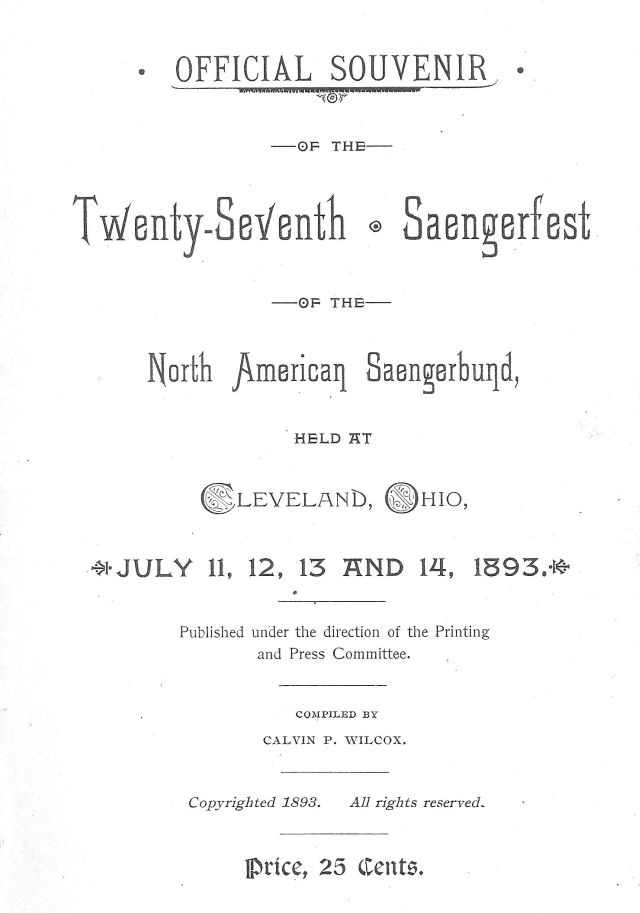 This cover of the 27th Sängerfest German Singing Festival, held in 1893 in Cleveland, Ohio, is courtesy of The Western Reserve Historical Society Library. (Double-click on it to enlarge) The program alone is 101 pages. Seventy different songs were presented in afternoon and evening concerts, ranging from Schubert’s “The Wanderer” to Mendelssohn’s “Walpurgis-Night.”
This cover of the 27th Sängerfest German Singing Festival, held in 1893 in Cleveland, Ohio, is courtesy of The Western Reserve Historical Society Library. (Double-click on it to enlarge) The program alone is 101 pages. Seventy different songs were presented in afternoon and evening concerts, ranging from Schubert’s “The Wanderer” to Mendelssohn’s “Walpurgis-Night.”
Included in the program is a history of the North American Sängerbund, which began in Cincinnati, Ohio in 1849. At the first singing festival, five societies came together from nearby towns, for a total of 118 singers. By 1860, there were 25 societies and 450 singers. In 1868, after a hiatus during the Civil War, there were 58 societies and 1200 singers. For a complete history of the society, still in existence today, visit their web site at Nord-Amerikanischer Sängerbund.
About a month ago, a friend told me about a German music program put on by the Sacramento German Genealogical Society (SGGS): Liedermatinée: an Afternoon of Favorite German Songs with Michael Mayer-Kielmann. Their program offered songs by Brahms and Haydn and the 20th century Heino, as well as classic folk songs like Silcher’s Lorelei. I have since learned the SGGS is a very active organization, with over 900 members and an award-winning journal, Der Blumenbaum.
How I would have loved to hear the SGGS program, and the 1893 Cleveland concerts, too. In the German song tradition, musicians such as Schubert and Silcher and countless others set poetry (of Goethe, Heine, Schiller and so on) to music. Popular music is always a favorite, as evidenced in this quote from the 1893 Sängerfest program: “Of all numbers on the programme the “Volkslieder” (Folks’ Songs) invariably please the most. In the first place, the singers prefer them, (because they require less study), secondly, because the sound effects of a grand chorus in sustained, not polyphonic works, are brought out better, and thirdly, the audience recognizes dear old friends in them, and as it requires no exertion to follow the music, the enjoyment is the greater.”

Pingback: When the Genius of Song Crowns the Gospel of Work | Belt Magazine | Dispatches From The Rust Belt